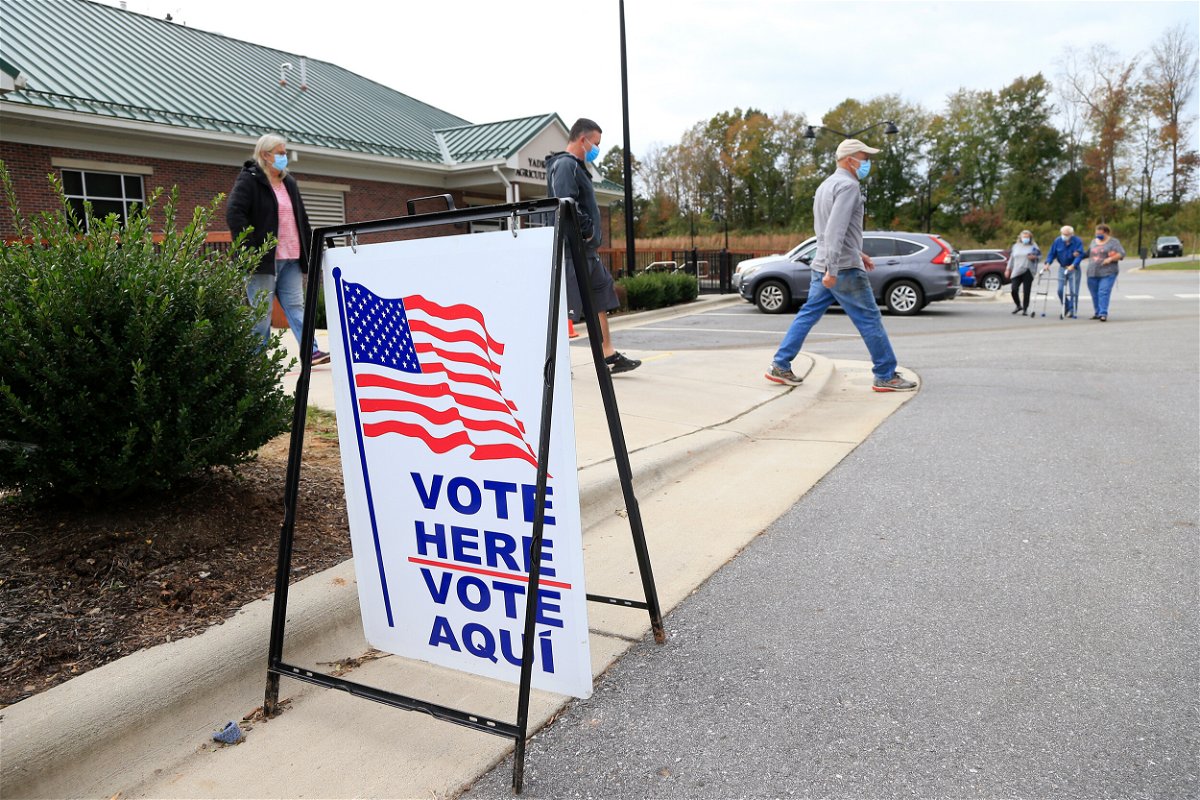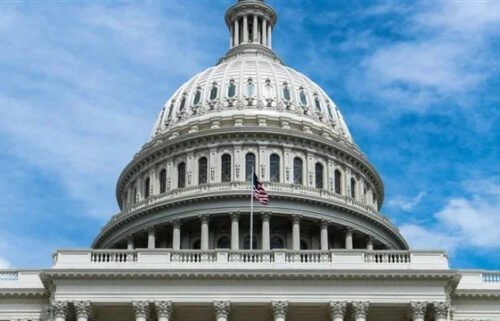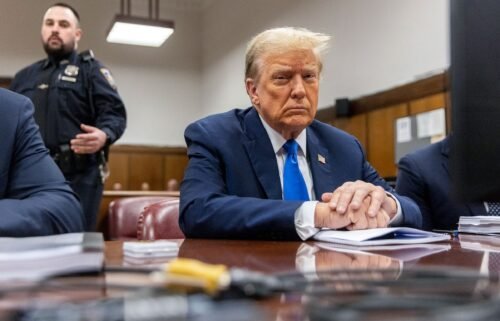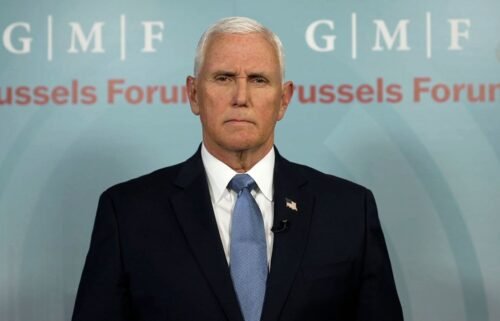Is the Supreme Court ready to upend the power of state courts in disputes over federal elections?

Voters arrive and depart a polling place on October 31
By Ariane de Vogue, CNN Supreme Court Reporter
As the Supreme Court continues to mull major questions concerning the future of Roe v. Wade and the Second Amendment, Republicans in North Carolina are now asking the justices — on an emergency basis — to possibly change how US elections are decided.
Election law experts are carefully watching the case, believing that the justices will ultimately reject a request from Republicans to freeze an opinion by the North Carolina Supreme Court that blocked a congressional map, drawn by the GOP-led legislature, that favors Republicans. Among other reasons, the justices may not want to step in with changes too close to election deadlines.
But embedded in the case are arguments that have attracted some members of the court’s right wing in the past as they apply to setting election rules and played a role in the litigation surrounding then-President Donald Trump’s quest to use the courts to overturn Joe Biden’s presidential election victory. If a majority of the court were ever to adopt those arguments, it could profoundly change the landscape of election law.
The questions involve a theory that state courts cannot interpret their own state constitutions when it comes to congressional redistricting and under rules related to federal elections. The theory is called the “Independent State Legislature claim” in legalese. The Electors Clause of the US Constitution vests “state legislatures” with the power to appoint presidential electors “in the manner” they choose. The Elections Clause gives them control over the “Times, Places and Manner” of holding elections. Under the theory being pushed, “legislature” excludes a role for state courts.
“The Elections Clause does not give the state courts, or any other organ of state government, the power to second-guess the legislature’s determinations,” the Republican challengers argue.
Critics, like Rick Hasen, an election law expert at the University of California, Irvine School of Law, say that the theory blocks a state court’s ability to protect voters under provisions of state constitutions.
It “could upend any rules that state courts — relying on state constitutions — put in place that affect federal elections, such as striking down voter ID laws under state constitutions,” Hasen said.
Traditionally, according to Hasen, legislatures have set ground rules for conducting an election, but those rules are also subject to state processes that include a role for election administrators and state courts to interpret the meaning of state election rules.
During the 2020 election cycle, four Supreme Court justices — Samuel Alito, Clarence Thomas, Neil Gorsuch, and Brett Kavanaugh — expressed some sympathy in three different disputes for the notion that state courts had overstepped their boundaries when resolving lawsuits about rules for elections.
Carolyn Shapiro, a professor at Chicago-Kent College of Law, said if the Supreme Court were to fully endorse the theory, that such a ruling could “embolden state legislatures to pass laws that would violate voters’ rights under state constitutions for any reason including partisan advantage.”
“That is an extreme departure from current understandings of election law,” she said and added that it was only in 2019 that all nine justices of the Supreme Court said that state constitutions could limit partisan gerrymandering.
North Carolina GOP’s arguments
The emergency application before the court was filed by North Carolina Republicans including state House Speaker Timothy Moore and state Senate President Pro Tempore Philip Berger.
Represented by David Thompson of Cooper & Kirk, they are asking the justices to freeze a decision by the North Carolina Supreme Court that held the congressional map was an unconstitutional partisan gerrymander under North Carolina law and that the General Assembly must not “dilute any individual’s vote on the basis of partisan affiliation.”
“It is the state judiciary that has the responsibility to protect the state constitutional rights of the citizens, this obligation to protect the fundamental rights of individuals is as old as the State,” the state Supreme Court said. It said that the congressional maps are “unconstitutional beyond a reasonable doubt” under several clauses of the North Carolina Constitution.
The Republicans also want the US Supreme Court to block a replacement map — drawn by state judges working as special masters — that could give Democrats another seat in 2023.
North Carolina is divided into 13 congressional districts having gained an additional seat after the 2020 census due to an increase in the state population.
In court papers they say that the state Supreme Court’s actions “nullify the North Carolina General Assembly’s regulations of the manner of holding federal elections in the State and replaces them with new regulations of the judiciary’s design.” They say the North Carolina Supreme Court’s actions “are fundamentally irreconcilable” with the federal Constitution.
“To secure self- government,” Thompson argues, the Constitution vests the power to regulate federal Senate and congressional elections in “each State’s legislature.” They say the state’s Supreme Court’s “usurpation of that authority simply cannot be squared” with the Elections Clause.
A coalition of voting rights groups, Democratic voters and the state’s board of elections filed responses on Wednesday, urging the Supreme Court to stay out of the dispute. They said that if the justices were to intervene now it would cause confusion and delay as well as “severe administrative difficulties.”
They also refuted — head on — the notion that the federal Constitution bars state courts’ involvement.
“The elimination of state autonomy is inconsistent with the historical practice and the intent of the Election Clause and invites the risk that federal courts will wrongly interpret state law — a significant risk given the difficulty federal courts have in mastering 50 different States’ laws,” Allison Riggs, a lawyer for Common Cause, argued in court papers. She said to accept the Republicans’ argument “that partisan gerrymandering claims are immune from state constitutional scrutiny by state courts would require this Court to overrule a century of precedent.”
“It would lead to an unprecedented upheaval of current election law and foreclose any legal relief for voters from extreme legislation, which state courts already found to be undemocratic,” Riggs said in an interview.
The court is expected to rule in the coming days. The justices could deny the Republicans’ stay request with no comment, leaving the issue hanging for the next case. But they could also move more aggressively, keeping the status quo for now but agreeing to hear the case next term adding another blockbuster case to the docket.
Shapiro is carefully watching the case. In a draft law review article, she says that the Constitution’s Electors and Elections clauses do not “compel a reading that excludes any role for state courts or any constraints imposed by state constitutions.”
“The Supreme Court has never held that when a state legislature regulates federal elections, it is free of substantive state constitutional constraints,” she wrote. But she acknowledges that in Bush v. Gore , the case that decided the 2000 election, then-Chief Justice William Rehnquist in an opinion joined by Thomas and the late Justice Antonin Scalia relied upon the theory to reject the Florida Supreme Court’s interpretation of Florida election law. Rehnquist did not command a majority.
“Even if the justices deny the legislators’ request in the North Carolina case, some of them may express support for this extreme view,” Shapiro said. She also noted that the case is on the court’s emergency docket, which means there will be no oral arguments or extensive briefing. “Whatever they say, in this rushed case, may well influence what lower courts do in the future.”
This story has been updated with additional details.
The-CNN-Wire
™ & © 2022 Cable News Network, Inc., a WarnerMedia Company. All rights reserved.


